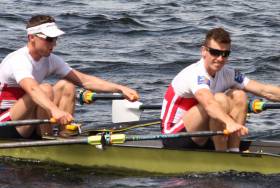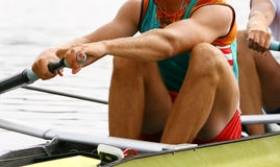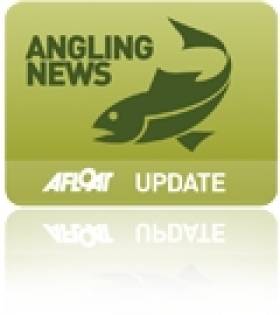Displaying items by tag: Clonmel
Lynch Has Terrific Win at Irish Rowing Championships
#Rowing: Two outstanding races brought the first session of the Irish Rowing Championships at the National Rowing Centre to a close today. Daire Lynch of Clonmel won the junior single sculls. He caught and passed Shandon's Ronan Byrne in the final quarter, but Byrne refused to give in easily and the two swept towards the finish line with a small margin separating them - Lynch won by just over four tenths of a second.
The junior women's double had a similar profile: Skibbereen hunted down and caught leaders Bann and held off their late charge to win by just over three tenths of a second.
UCD had a surprisingly emphatic win over a Skibbereen/UCC composite in the women's senior four - a first senior win for bow woman Eimear Lambe. In the men's double, Shane O'Driscoll and Mark O'Donovan were similarly impressive in their win over Old Collegians.
Neptune had started the session with their first Championships win in years, in the novice coxed quadruple. Fermoy won the women's Club coxed four, while Cork and NUIG won hte women's intermediate pair and men's intermediate coxed four respectively.
Irish Rowing Championships, National Rowing Centre, Cork, Day One (Selected Results)
Men
Four - Inter, coxed: 1 NUIG 6:26.811.
Sculling, Quadruple - Novice, coxed: Neptune 6:44.559.
Double - Senior: 1 Skibbereen 6:32.773, 2 UCD 6:34.914, 3 Castleconnell 6:39.727.
Single - Junior: 1 Clonmel (D Lynch) 7:04.040, 2 Shandon (R Byrne) 7:04.462, 3 Shandon (S O'Sullivan) 7:23.197.
Women
Four - Senior: 1 UCD 6:54.652, 2 Skibbereen/UCC 6:58.902, 3 Trinity 7:04.715. Club, coxed: Fermoy 7:16.116.
Pair - Intermediate: Cork 7:36.488
Sculling
Double - Junior: 1 Skibbereen B 7:19.682, 2 Bann 7:91.995, 3 Neptune 7:33.305.
Doyle Pips Lynch in Photo Finish at Skibbereen Regatta
#Rowing: Philip Doyle of Queen’s University beat Daire Lynch of Clonmel by three tenths of a second in the Division One A Final of the men’s single sculls at Skibbereen Regatta today. Monika Dukarska won the women’s equivalent, with lightweight oarswoman Denise Walsh second. Trinity took the men’s senior pair through Patrick Moreau and Michael Corcoran and their men’s novice eight won the Division Two A Final. Cork Boat Club won the women’s Division One pair with their junior crew.
Skibbereen Regatta, National Rowing Centre, Cork, Saturday (selected results)
Men
Eight – Division Two – A Final: 1 Trinity A (novice) 6:18.4; 2 UCC (club two) 6:22.0; 4 Cork (jun 18B) 6:30.7. B Final: Shandon (jun 16) 6:33.9.
Pair – Division One – A Final: 1 Trinity (sen) 6:56.8, 2 Commercial A (sen) 7:00.0, 3 Commercial C (sen) 7:01.2; 5 UCC (inter) 7:11.3. B Final: 1 Trinity A (sen) 7:12.4; 4 Queen’s (club one) 7:27.1.
Sculling,
Single – Div One – A Final: 1 Queen’s (P Doyle, sen) 7:18.2, 2 Clonmel (D Lynch; jun 18A) 7:18.5, 3 Queen’s (C Beck; lwt) 7:24.3; 4 Skibbereen (F McCarthy; inter) 7:26.4. B Final: 1 Garda (D Kelly; sen) 7:32.8; 5 UCC (D Synott; club one) 7:46.2. C Final: Portadown (S McKeown; sen) 7:25.0
Women
Pair – Div One – A Final: 1 Cork (jun 18A) 7:55.47, 2 UCC (inter) 8:08.1, 3 Queen’s (inter) 8:14.8; 4 Trinity (club one) 8:21.6.
Sculling,
Quadruple – Div Two – A Final: 1 Cork A (jun 18B) 7:46.4; 2 Workman’s (jun 16) 7:49.0; 6 St Michael’s (club two) 8:15.6. C Final: 5 Univ of Limerick (nov) 8:56.2.
Single – Div One – A Final: 1 Killorglin (M Dukarska; sen) 7:55.4, 2 Skibbereen (D Walsh; sen) 7:58.9, 3 Skibbereen (S Dolan; sen) 8:05.8; 4 Skibbereen (E Hegarty; jun 18A) 8:12.6, 5 UCD (A Crowley; inter) 8:20.4. B Final: 1 Skibbereen (O Hayes; lightweight) 8:27.7; 4 Belfast BC (O Blundell; club one) 8:32.8. C Final: 1 Garda (B Larsen; inter) 8:36.81.
New Angling Guides and Salmon Bait Restrictions
#Angling - Inland Fisheries Ireland has recently added two new guides to its list of resources for anglers fishing in Ireland.
The West of Ireland Sea Angling Guide covers the region from Westport, in Clew Bay, south to the rocky headlands of North Clare, including Galway Bay, Connemara, Killary, Louisburgh, Clew Bay, and the offshore islands of Inisbofin, Inisturk and the Aran Islands.
The guide is in no way comprehensive, and the list of marks and venues is just a sample of what is available across the region's waterways. There are literally hundreds of shore marks in the region that have rarely, if ever, been fished, but the potential waiting to be explored is immense. Getting off the beaten path and trying a new mark may produce the fish of a lifetime.
In addition, the County Sligo Game Angling Guide covers the main game angling waters in the district. It contains information on the location of each fishery as well as details in relation to contacts, permitted angling methods, angling seasons, etc.
Meanwhile, IFI has received numerous submissions from individual anglers, angling organisations and angling tourist providers regarding restrictions on the use of prawn/shrimp as a salmon angling bait on the River Suir for the 2013 season.
IFI is interested to hear the views of other angling stakeholders or from those who wish to make further submissions.
Submissions can be made to IFI Clonmel by email at [email protected] or by post to Inland Fisheries Ireland, Anglesea Street, Clonmel, Co Tipperary.
The closing date for receipt of submissions is 28 February 2013.































































